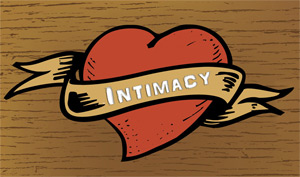By Denise O’Doherty, Psychotherapist
Intimacy is a bond between two people based on trust, respect, and the ability to share deeply. You can have intimate relationships with lovers, partners, co-workers, acquaintances friends, and family members. In an intimate relationship, you experience the give and take of being real and vulnerable, as you share a connection.
 When a couples come to therapy, I often ask: “What is it that keeps you together?”. Answers range from convenience, sex, money, companionship to the most frequent response, “We love each other”. The problem with this response is that love means different things to different people. Sometimes the expectations that one associates with love can add to the relationships conflicts. i.e. “If you loved me you would do this ..…or you would feel this ..…” Then, I may ask, “Do you trust each other?” Interestingly, many people emphatically say “No, we love each other but we don’t trust each other”. Trust and good communication are the two main ingredients necessary for intimacy. Therefore, love without trust is not enough. Without trust we don’t feel safe. Many people have problems with trust. If handling things alone and taking care of yourself was what you had to do as a child, it may feel unfamiliar and scary to be in a close relationship. On the other hand, come people cling to those they love, being overly jealous and unable to tolerate a healthy level of independence.
When a couples come to therapy, I often ask: “What is it that keeps you together?”. Answers range from convenience, sex, money, companionship to the most frequent response, “We love each other”. The problem with this response is that love means different things to different people. Sometimes the expectations that one associates with love can add to the relationships conflicts. i.e. “If you loved me you would do this ..…or you would feel this ..…” Then, I may ask, “Do you trust each other?” Interestingly, many people emphatically say “No, we love each other but we don’t trust each other”. Trust and good communication are the two main ingredients necessary for intimacy. Therefore, love without trust is not enough. Without trust we don’t feel safe. Many people have problems with trust. If handling things alone and taking care of yourself was what you had to do as a child, it may feel unfamiliar and scary to be in a close relationship. On the other hand, come people cling to those they love, being overly jealous and unable to tolerate a healthy level of independence.
Intimacy isn’t something you can experience alone. By it’s very nature, it assumes a relationship and a relationship means risk. The other half of any relationship is a person you can’t control. But in a loving relationship, you and your partner can create intimacy with excitement, passion, good communication and trust. Rewards are great when you are willing to work together.
The following is an INTIMACY ASSESSMENT meant to be used as a guide to assess intimacy in your relationship. Think about a partner or a close friend and ask yourself the following:
- Do I respect this person?
- Does this person respect me?
- Is this a person with whom I can communicate with ease?”
- Do we work through conflicts together well?
- Do we both compromise?
- Is there give and take?
- Can I be honest? Can I show my real feelings?
- Do we both take responsibility for the relationships successes and problems?
- Could I talk to this person about the effects that childhood abuse or trauma is having on our relationship?
- Is there room for me to grow in this relationship?
- Am I able to reach my own goals within this relationship?
- Is this person supportive of the kind of changes I am trying to make?
- Is this person willing to help me?
Use these questions to see where your intimacy skills are strong in your relationship and where they could use attention. It’s important to assess from time to time what is working and what isn’t in your relationship. Taking time to make occasional changes for the better is a great skill that can keep spark in your relationship. It keeps it from becoming stuck or boring. Other skills that promote intimate relationships are: saying what you mean and meaning what you say, listening clearly without judgement, letting go of control of your partner, asking for what you need, being willing to negotiate and being willing to compromise.
Good relationships add fun and joy to life and give us rewards that last a lifetime. It is said that it is not about finding the right person, but about becoming the right person. With trust, communication and good intimacy skills I believe we can have both.
